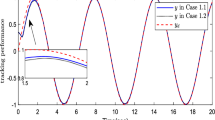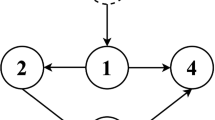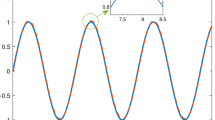Abstract
In this paper, the optimal tracking performance of communication constrained systems by considering quantization, packet dropouts, noise and control input power constraints is studied. The frequency domain method is utilized to analyze the optimal tracking performance of the communication constrained systems. The explicit expression of the optimal tracking performance is deduced by partial fraction decomposition method and inner-outer factorization method. The results indicate that the optimal tracking performance for a controlled object is only affected by the plant’s inherent characteristics (non-minimum phase zeros and unstable poles) and network factors (quantization, packet dropouts and noise). Eventually, a simulation is offered to validate the theory.
Similar content being viewed by others
References
X.-M. Zhang, Q.-L. Han, X. Ge, D. Ding, L. Ding, D. Yue, and C. Peng, “Networked control systems a survey of trends and techniques,” Automatica, vol. 7, no 1, pp. 1–17, January 2020.
X.-K. Liu, Y.-W. Wang, P. Lin, and P. Wang, “Distributed supervisory secondary control for a DC microgrid,” IEEE Transactions on Energy Conversion, vol. 35, no. 4, pp. 1736–1746, December 2020.
Y. W. Wang, Z. H. Zeng, X. K. Liu, and Z. W. Liu, “Input-to-state stability of switched linear systems with unstabilizable modes under DoS attacks,” Automatica, vol. 146, 110607, 2022.
L. L. Hao, X. S. Zhan, J. Wu, and H. C. Yan, “Fixed-time group consensus of nonlinear multi-agent systems via pinning control,” International Journal of Control, Automation, and Systems, vol. 19, no. 2, pp. 200–2008, 2021.
M. Huang, Y. Lu, and R. P. Martins, “A reconfigurable bidirectional wireless power transceiver for battery-to-battery wireless charging,” IEEE Transactions on Power Electronics, vol. 34, no. 8, pp. 7745–7753, 2019.
J. B. Qiu, H. J. Gao, and M. Y. Chow, “Networked control and industrial applications,” IEEE Transactions on Industrial Electronics, vol. 63, no. 2, pp. 1203–1206, February 2016.
S. Hartzell, C. Stubel, and T. Bonaci, “Security analysis of an automobile controller area network bus,” IEEE Potentials, vol. 39, no. 3, pp. 19–24, May 2020.
C. Yang, X. Wang, Z. Li, Y. Li, and C.-Y. Su, “Teleoperation control based on combination of wave variable and neural networks,” IEEE Transactions on Systems, Man, and Cybernetics: Systems, vol. 47, no. 8, pp. 2125–2136, August 2017.
C. Yang, X. Wang, L. Cheng, and H. Ma, “Neural-learning-based telerobot control with guaranteed performance,” IEEE Transactions on Cybernetics, vol. 47, no. 10, pp. 3148–3159, October, 2017.
H. Zhang, Y. Shi, and A. S. Mehr, “Robust ℌ∞ PID control for multivariable networked control systems with disturbance/noise attenuation,” International Journal of Robust and Nonlinear Control, vol. 22, no. 2, pp. 183–204, January 2011.
L. Jin, S. Li, B. Hu, M. Liu, and J. Yu, “A noise-suppressing neural algorithm for solving the time-varying system of linear equations: A control-based approach,” IEEE Transactions on Industrial Informatics, vol. 15, no. 1, pp. 236–246, January 2018.
H. Zhang, Y. Shi, J. Wang, and H. Chen, “A new delay-compensation scheme for networked control systems in controller area networks,” IEEE Transactions on Industrial Electronics, vol. 65, no. 9, pp. 7239–7247, September 2018.
R. Q. Lu, Y. Xu, and R. D. Zhang, “A new design of model predictive tracking control for networked control system under random packet loss and uncertainties,” IEEE Transactions on Industrial Electronics, vol. 63, no. 11, pp. 6999–7007, September, 2018.
H. G. Yang, Y. Xu, and J. H. Zhang, “Event-driven control for networked control systems with quantization and Markov packet losses,” IEEE Transactions on Cybernetics, vol. 47, no. 8, pp. 2235–2243, August, 2017.
J. S. Song and X. H. Chang, “ℌ∞ controller design of networked control systems with a new quantization structure,” Applied Mathematics and Computation, vol. 376, 125070, 2020.
J. Zhang, C. Peng, X. P. Xie, and D. Yue, “Output feedback stabilization of networked control systems under a stochastic scheduling protocol,” IEEE transactions on cybernetics, vol. 50, no. 6, pp. 2851–2860, June 2020.
S. H. J. Heijmans, R. Postoyan, D. Nešić, W. P. Maurice, and H. Heemels, “An average allowable transmission interval condition for the stability of networked control systems,” IEEE Transactions on Automatic Control, vol. 66, no. 6, pp. 2526–2541, June 2021.
T. Zhao, M. B. Huang, and S. Y. Dian, “Robust stability and stabilization conditions for nonlinear networked control systems with network-induced delay via T-S fuzzy model,” IEEE Transactions on Fuzzy Systems, vol. 29, no. 3, pp. 486–499, March 2021.
W. Zheng, Z. Zhang, H.-K. Lam, F. Sun, and S. Wen, “LMIs-based stability analysis and fuzzy-logic controller design for networked systems with sector nonlinearities: application in tunnel diode circuit,” Expert Systems with Applications, vol. 198, 116627, 2022.
N. Zhao, P. Shi, W. Xing, and J. Chanmbers, “Observer-based event-triggered approach for stochastic networked control systems under denial of service attacks,” IEEE Transactions on Control of Network Systems, vol. 8, no. 1, pp. 158–167, March 2021.
H. Liu, X. Wang, X. Yang, and X. Yang, “Robust adaptive fault-tolerant containment control of networked heterogeneous agent systems with multiple active leaders and mismatched affine uncertainties,” International Journal of Control, Automation, and Systems, vol. 22, no. 1, pp. 128–136, January 2022.
X. Wang, J. H. Park, H. Liu, and X. Zhang, “Cooperative output-feedback secure control of distributed linear cyberphysical systems resist intermittent DoS attacks,” IEEE Transactions on Cybernetics, vol. 51, no. 10, pp. 4924–4933, October 2021.
J. L. Liu, Z. G. Wu, D. Yue, and J. H. Park, “Stabilization of networked control systems with hybrid-driven mechanism and probabilistic cyber attacks,” IEEE Transactions on Systems, Man, and Cybernetics: Systems, vol. 51, no. 2, pp. 943–953, February 2021.
X. S. Zhan, J. Wu, T. Jiang, and X.-W. Jiang, “Optimal performance of networked control systems under the packet dropouts and channel noise,” ISA Transactions, vol. 58, pp. 214–221, September 2015.
C.-Y. Chen, F. Liu, L. Wu, H. Yan, W. Gui, and H. E. Stanley, “Tracking performance limitations of networked control systems with repeated zeros and poles,” IEEE Transactions on Automatic Control, vol. 66, no. 4, pp. 1902–1909, April 2021.
J. Wu, Z.-J. Zhou, X.-S. Zhan, H.-C. Yan, and M.-F. Ge, “Optimal modified tracking performance for MIMO networked control systems with communication constraints,” ISA Transactions, vol. 68, pp. 14–21, May 2017.
Z.-H. Guan, C.-Y. Chen, G. Feng, and T. Li, “Optimal tracking performance limitation of networked control systems with limited bandwidth and additive colored white Gaussian noise,” IEEE Transactions on Circuits and Systems I: Regular Papers, vol. 60, no. 1, pp. 189–198, January 2013.
X. Hu, X. Zhan, J. Wu, and H. Yan, “Performance limits of network delay systems based on bandwidth and packet loss constraints,” Asian Journal of Control, vol. 24, no. 6, pp. 3466–3474, 2022.
X.-S. Zhan, L.-L. Cheng, J. Wu, and H.-C. Yan, “Modified tracking performance limitation of networked time-delay systems with two-channel constraints,” Journal of the Franklin Institute, vol. 356, no. 12, pp. 6401–6418, August 2019.
J. Chen, L. Qiu, and O. Toker, “Limitations on maximal tracking accuracy,” IEEE Transactions on Automatic Control, vol. 45, no. 2, pp. 326–331, February 2000.
Author information
Authors and Affiliations
Corresponding author
Additional information
Conflicts of Interests
There is no conflict of interest in this article.
Mengxi Jiang is pursuing an M.E. degree in the School of Electrical Engineering and Automation, Hubei Normal University, Huangshi, China. She received her B.Eng. degree in the Huanggang Normal University, Huanggang, China in 2019. Her research interests include the performance limits and design of communication constrained systems.
Xisheng Zhan is a professor in the School of Electrical Engineering and Automation, Hubei Normal University. He received his B.S. and M.S. degrees in control theory and control engineering from the Liaoning Shihua University, Fushun, China, in 2003 and 2006, respectively. He received his Ph.D. degree in control theory and applications from the Department of Control Science and Engineering, Huazhong University of Science and Technology, Wuhan, China, in 2012. His research interests include networked control systems, robust control, and iterative learning control.
Jie Wu is a professor in the School of Electrical Engineering and Automation, Hubei Normal University. She received her B.S. and M.S. degrees in control theory and control engineering from the Liaoning Shihua University, Fushun, China, in 2004 and 2007, respectively. Her research interests include networked control systems, robust control, and complex network.
Tao Han received his Ph.D. degree from the School of Artificial Intelligence and Automation, Huazhong University of Science and Technology, Wuhan, China, in 2017, and he is currently a professor in the School of Electrical Engineering and Automation, Hubei Normal University. His research interests include cooperative control of multi-agent systems and complex networks.
Huaicheng Yan is a Professor with the School of Information Science and Engineering, East China University of Science and Technology. He received his B.S. degree in automatic control from Wuhan University of Technology, Wuhan, China, in 2001, and received a Ph.D. degree in control theory and control engineering from the Department of Control Science and Engineering, Huazhong University of Science and Technology, Wuhan, China, in 2007. His current research interests include networked systems and multi-agent systems.
Publisher’s Note
Springer Nature remains neutral with regard to jurisdictional claims in published maps and institutional affiliations.
This paper was partially supported by the National Natural Science Foundation of China under Grants 62271195, 61971181 and 62072164, and Outstanding Youth Science and Technology Innovation Team in Hubei Province under Grant T2022027 and B2022156.
Rights and permissions
About this article
Cite this article
Jiang, M., Zhan, X., Wu, J. et al. Optimal Tracking Performance of Communication Constrained Systems with Quantization and Packet Dropouts. Int. J. Control Autom. Syst. 21, 1748–1756 (2023). https://doi.org/10.1007/s12555-022-0239-9
Received:
Revised:
Accepted:
Published:
Issue Date:
DOI: https://doi.org/10.1007/s12555-022-0239-9




